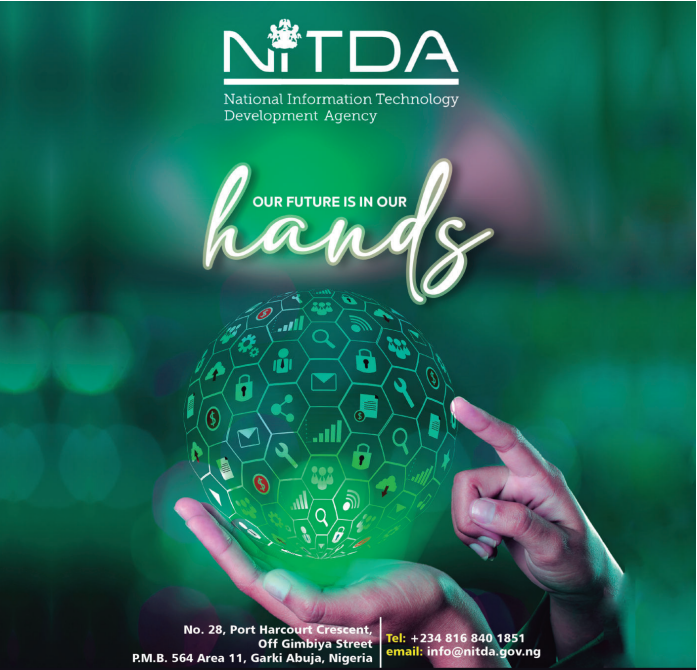NITDA: Turning Nigeria into a tech superpower
Through an aggressive plan of technological development, NITDA is connecting Nigeria to the world of tomorrow.
A techie at heart, NITDA Director General, Mr Kashifu Inuwa Abdullahi began as an engineer, but moved on to solution design when he learned that the key to developing businesses was in using the technology available to yield the best possible results. From his role as Technology Architect at the Central Bank of Nigeria, where he worked on the country’s cashless infrastructure, he moved to the National Information Technology Development Agency (NITDA) as Technical Assistant to the immediate past Director General, whom he eventually succeeded. “It was eye-opening to me”, says Mr Inuwa, “I had always wanted to be Chief Information Officer of a company, and in NITDA I became the Chief Technology Officer of Nigeria”.
Established in 2001 to implement the country’s pioneer National IT policy, the Agency had a paradigm shift in 2019, when it was tasked with implementing substantial initiatives of the newly crafted National Digital Economy Policy and Strategy (NDEPS), focusing on using technology to foster economic growth and development. Under the leadership of Kashifu, the Agency’s target became to make Nigeria a key global player in technology innovation by playing to the country’s strengths: the largest market in Africa, with a large and young population with the power of becoming a global tech talent hub, while closing the talent deficit gap faced by world. “Talent is the keyword”, explains Mr. Inuwa. “We already supply the world with talent in sports, music, and films, so we believe we can do it in technology as well”.

Such a difficult task required tackling many areas at once. For this purpose, NITDA designed a plan based on seven strategic pillars, the first of which is developmental regulation. “We call it developmental because its purpose is not to stifle innovation, but to unlock opportunities and work hand in hand with the industry”, the DG explains. In this spirit, a policy was drawn to democratize access to markets, enable innovation, protect consumers and suppliers, and increase efficiency in service delivery, with one underlying approach: a non-ruled regulation that allows and encourages industries to set their own standards. “The time that government sits in an office and used armchair theory to produce regulation is gone, we have to work within the ecosystem”, he explains.
With the startup ecosystem in mind, the Agency focused on digital transformation, digitizing conventional government and business processes while also fostering digitalization, using the power provided by technology (ubiquitous data, unlimited connectivity, and processing power) to provide solutions for innovative startups. From 2019 alone, NITDA has impacted in this way 219 startups that have won prizes all over the world and more importantly have created 14,000 jobs in the country. This has no doubt accelerated the job creation drive aimed at closing the gap in tech jobs and even help address the country’s forex challenges. “Remote work in the tech industry could produce over $50.9 billion annually in foreign exchange earnings, so our main task is to get our people into the global value chain”, the optimistic Kashifu projected.
For this, the key is indeed training in skills and capacity building, the second pillar of NITDA’s roadmap which is already underway. Providing training for over 200,000 Nigerians and focusing strongly on promoting BPO, the aim is to become the global preferred outsourcing destination, perhaps even over India, making the most of the fact that Nigerians are young, speak English, and enjoy a convenient time zone. “Digital economy is knowledge-based, and talent is our most valuable resource”, he added.
As the race for new technologies increases, NITDA is keen on capturing value from innovation, which is why it dedicated specific policy to target blockchain technology, training 32,000 Nigerians in the emerging field. Cybersecurity, which costs the world 6 trillion dollars, and finally artificial intelligence, which according to the Nigeria’s CTO is where the country could make the largest leap forward: “We want to make Nigeria a superpower in AI because it will make us a force to be reckoned with when it comes to technology”.
To make this all happen, the Agency is lastly working on securing investments from the US, which also use non-rule-based regulation, lead in innovation, and need the talent that Nigeria can provide, holding the key to developing a continent with 20% of the global population. “Providing talent and attracting investors into the startup ecosystem is how we move onto the big leagues”, concludes Kashifu Inuwa with a smile


